The Department of Economics, Air Force Institute of Technology, Kaduna, came into existence as one of the pioneering Departments, at the inception of the Institution, in the Faculty of Social and Management Sciences in the 2018/2019 academic Session.
The Department commenced academic activities on 28th November, 2018 with 61 students under the pioneer Head of Department Mr. M.S Agility. Today, the population of students and staff has grown exponentially. All the lecturers are on tenure, contract, sabbatical and visiting appointment.
Vision of the Department:
To be a leading Department in the development of skilled Aeronomic Manpower that will stimulate the aviation industry growth and the economy at large.
Mission of the Department:
The mission statement of the Department is to produce graduates with cognate economic and/or Aeronomic background, equipped with quantitative and qualitative skills and abilities in modelling and analysing the critical and dynamic aerospace industry and the economy at large through innovative courses that can impact positively on the economic and Aeronomic policy formulation and its implementation.
Philosophy of the Department
The philosophy and mission statement underlying the economics programmes of Nigeria University is to produce graduates equipped with critical skills and ability to: abstract using simplified models that identify the essence of a problem; analyse and reason – both deductively and inductively; marshal evidence, assimilate structure and analyse qualitative and quantitative data; communicate concisely the results to a wide audience, including those with no training in economics; think critically about the limits of one’s analysis in a broader socio-economic context; and draw economic policy inferences and to recognize the potential constraint in their implementation.
Also, the philosophy underlying the work of the Department is to produce a flow of graduates imbued with high capacity to understand socio-economic problems and proffer solutions. This is achievable by not only equipping the students with a broad foundation in the field of social sciences but also in grounding them in the application of economics theory and the tools of economic analysis in solving human problems.
Objectives of the Degree Programme:
- Provide training in the principles of economics and their application appropriate to the type of degree concerned: single, joint and combined studies;
- Stimulate students intellectually through the study of economics and to lead them to appreciate its application to a range of problems and its relevance in a variety of contexts;
- Provide a firm foundation of knowledge about the workings of an economy and to develop the relevant skills for the constructive use of that knowledge in a range of settings;
- Develop in students the ability to apply the analytical tools, knowledge and skills acquired to the solution of societies’ economic problems,
- Equip students with appropriate tools of analysis to tackle issues and problems of economic policy;
- Develop in students, through the study of economics, a range of transferable skills that will be of value in employment and self-employment;
- Provide students with analytical skills and the ability to develop simplified frameworks for studying the real world;
- Provide students with the knowledge and skill base, from which they can proceed to further studies in Economics, related areas or in interdisciplinary areas that involve Economics; and
- Generate in students an appreciation of the economic dimensions of wider social and political issues.

